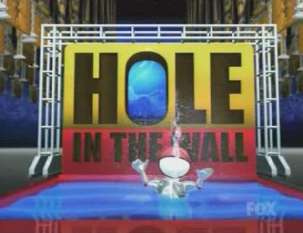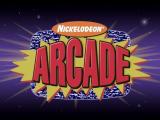Gameplay
Two teams of three children compete in a series of weird, outrageous and unusual events,; all played against nine pre-videotaped on-the-street contestants.
Rounds 1 and 2
In the first two rounds, one player from each team chose a video on-the-street player from the wall (hence the name of the show) to play against in a stunt. A brief videotaped interview was then played, after which host Zeno explained the stunt. The stunt began with Zeno and the audience counting down (5... 4... 3... 2... 1... GO!), and the in-studio player's job was to beat the videotaped on-the-street player (sometimes within a time limit). If successful, the contestant earned points for the team, if unsuccessful, no points were awarded (ties always went to the on-the-street player).
One of the on-the-street players was dubbed the "Double Trouble" player, so-called because if the in-studio contestant wins the stunt, he/she earned double the points for the team.
Point values
| Rounds | Single | Double |
|---|
| Round 1 | 100 | 200 |
| Round 2 | 200 | 400 |
Round 3 (Head-to-Head Challenge)
The final two players from both teams competed against each other and one last video player in this deciding round called "The Head-to-Head Challenge". To start, the video challenger's interview was played, then the challenge was explained and played. The first studio contestant to beat the video challenger earned 300 points, with an additional 250 points awarded for beating the studio opponent. (In the event of a tie between studio players, no points were awarded.)
The team with the most points won the game and went on to play for a grand prize. The theoretical maximum score was 1,050 points (100 in round 1, 400 in round 2 [via "Double Trouble"], and 550 in round 3).
The Ultimate Showdown (Bonus Round)
In the bonus game, the winning team played one last game, this time against a member of the studio audience. After the game was explained, the round began. If any member of the winning team could beat the audience member, the team won a grand prize for each team member; if not, the winning team took home a consolation prize. Plus the audience member gets a chance to come back to the show with two other teammates

A game show is a genre of broadcast viewing entertainment where contestants compete for rewards. The shows are typically directed by a host, who explains the rules of the game as well as commentating and narrating where necessary. The history of the game shows dates back to the late 1930s when both radio and television game shows were broadcast. The genre became popular in the United States in the 1950s, becoming a regular feature of daytime television.

Double Dare is an American game show in which two teams compete to win cash and prizes by answering trivia questions and completing messy stunts known as physical challenges. It originally ran from 1986 to 1993. A revival ran in 2000, and the most recent revival ran from 2018 to 2019.
Remote Control is an American TV game show that ran on MTV for five seasons from 1987 until 1990. It was MTV's first original non-musical program and first game show. A concurrent syndicated version of the series ran during the 1989-90 season and was distributed by Viacom. Three contestants answered trivia questions on movies, music, and television, many of which were presented in skit format.

Beat the Clock is an American television game show that involves people trying to complete challenges to win prizes while faced with a time limit. The show was a creation of Mark Goodson-Bill Todman Productions.

Fear Factor was an American stunt/dare game show that first aired on NBC from 2001 to 2006 and was initially hosted by comedian and UFC commentator Joe Rogan. The show was adapted by Endemol USA from the original Dutch series titled Now or Neverland.

Password is an American television game show in which two teams, each composed of a celebrity player and a contestant, attempt to convey mystery words to each other using only single-word clues, in order to win cash prizes.

What Would You Do? is a 30-minute television show hosted by Marc Summers shown on Nickelodeon from 1991 to 1993. Robin Marrella acted as the on-camera stagehand for the show's first season. Both Summers and Marrella performed their respective duties on Double Dare, also on Nickelodeon. The show was produced in Nickelodeon Studios at Universal Studios in Florida; some early segments were produced at Universal Studios in Hollywood.
Cram is an American game show which aired on Game Show Network in 2003. The show featured two teams, each composed of two contestants. For 24 hours before taping, the contestants were sequestered and sleep deprived at a storefront. Contestants were then escorted to Sony Pictures Studios, in Culver City, California, where the actual gameplay would commence; with the intent of the contestants staying awake, and "cramming" various material such as trivia questions and jokes, which they would then answer on the show while attempting physical stunts in an attempt to stay awake. Graham Elwood was the show's host, with assistance from Berglind Icey, Arturo Gil, and Andrea Hutchman.

Fun House is an American children's television game show that aired from September 5, 1988 to April 13, 1991. The first two seasons aired in daily syndication, with the Fox network picking it up and renaming it Fox's Fun House for its third and final season.
It's Academic is an Australian children's game show which is based on the long-running American version of It's Academic, and pits students from different schools against each other in a test of knowledge covering a number of diverse subjects including English, mathematics, science, geography, sport, music and popular culture.

Shop 'til You Drop is an American game show that was on the air intermittently between 1991 and 2005. Four different series were produced during that time, with the first premiering on Lifetime on July 8, 1991, and the fourth series airing its final episode on May 27, 2005, on PAX TV.

Shopping Spree is a game show that aired on the Family Channel for two seasons from September 30, 1996, to October 30, 1997, with reruns airing until August 14, 1998. Two teams of two unacquainted players went on a shopping spree at six stores, each with four prizes, on a fictional street on stage. The object of the game was to match the desired prizes with visual clues given by the contestant in the quickest amount of time. The show was hosted by Ron Pearson, announced by Burton Richardson and produced by Jay Wolpert Enterprises and MTM Enterprises.
It Takes Two is a game show in which contestants gave numerical answers to questions. The original program was created and produced by Ralph Andrews and aired on NBC from March 31, 1969, to July 31, 1970, at 10:00 AM Eastern. A second version, produced by Mark Phillips Philms & Telephision, aired on The Family Channel in 1997.

Gameshow Marathon is an American television program which aired on CBS from May 31 to June 29, 2006. It is based on the United Kingdom series Ant & Dec's Gameshow Marathon which aired on ITV in 2005. It also aired in Canada on CTV.

Video Power is an American television series that aired in two different formats from 1990 to 1992 in syndication. Both formats revolved around video games, and actor Stivi Paskoski presided over both series playing video game master Johnny Arcade.

Real World/Road Rules Challenge: The Gauntlet III is the 15th season of the MTV reality game show, The Challenge.

Hole in the Wall is an American game show that has aired in two versions on American television.
The Anniversary Game was a daily syndicated game show that involved three married couples competing for points and prizes by performing stunts and answering questions, à la Beat the Clock. The host was Alan Hamel, with voice-over artist Dean Webber announcing.

Nick Arcade is an American children's game show created by James Bethea and Karim Miteff and hosted by Phil Moore, with Andrea Lively announcing, that aired on Nickelodeon in 1992. It aired originally during weekend afternoons, with reruns airing until September 28, 1997. In the first season, the shows were taped in December 1991 and aired in early 1992. It was taped at Nickelodeon Studios at Universal Studios Florida in Orlando. In Nick Arcade, two teams of contestants played two initial trivia rounds, with the winning team advancing to the "Video Zone" to play against the virtual "Video Game Wizard" of the day.

BrainSurge is an American children's game show that aired on Nickelodeon and was hosted by Jeff Sutphen. The show taped its first season in February 2009, and debuted on September 28, 2009. The show's format was adapted from the Japanese game show Brain Survivor. The U.S. version was created by Scott A. Stone, co-creator of Legends of the Hidden Temple, and Clay Newbill, executive producer of The Mole.













